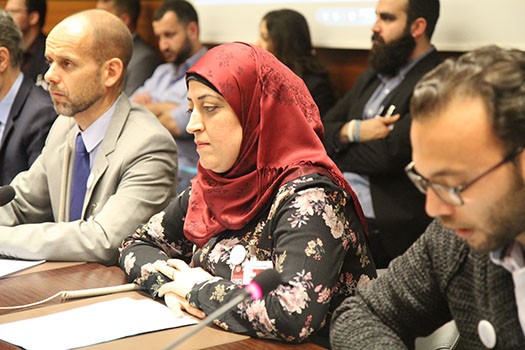The following is an overview of the Save Syrian Schools Campaign’s public events in Geneva in March 2018.
March 21, 2018—Side Event to the UN Human Rights Council
Organizations involved with the Save Syrian Schools project made a joint statement of its findings at a side event to the 37th session of the Human Rights Council in which they demanded action and offered recommendations based on their analysis of attacks on schools and their impact. The Ambassador of the Permanent Mission of the United Kingdom to the United Nations in Geneva made opening remarks, signaling support. Representative from more than 20 other member states attended, and many expressed interest in the project and in the recommendations, most notably the recommendation to initiate dialogue on creating a distinctive emblem to protect schools from attack and the recommendation for governments that have not already done so to immediately sign and endorse the Safe Schools Declaration. Thus far, 74 member states have signed the declaration.
March 22, 2018—Panel of Conscience
Before a “Panel of Conscience,” four courageous survivors gave their devastating accounts of the attacks on their schools and communities in Syria. Fernando Travesí, Executive Director of ICTJ, opened the session, calling on the entire international community to come together to do its part to “denounce and stop the massive violations of human rights that are occurring in Syria, address their consequences, and bring justice to victims.”
The hearing was presided over by a Panel of Conscience consisting of Pablo De Greiff, former UN Special Rapporteur on the promotion of truth, justice, reparation and guarantees of non-recurrence; Navanethem “Navi” Pillay, former UN High Commissioner for Human Rights; and David Tolbert, then-President of ICTJ. Among the victims who gave testimony were Mohamed Shehab, a 16-year old student from Damascus; Rama Mahmoud, a mother and a teacher from the province of Raqqa; Tarek Al Massri an 18-year-old from Homs; and a mother named Raneem Mahrous. The testimonies shine a light on the immense human toll being wrought daily on the lives and futures of Syria’s children—individual stories that are so often missed amid the coverage of other world events.
“After boldly sharing their harrowing experiences and having their stories heard and acknowledged by human rights experts, one victim said that she felt as if they had achieved justice for the first time,” said Fernando Travesi. “The world can no longer sit passively by as Syrians struggle for basic protections for children who, while seeking to pursue their education, have become instruments of war.”
As the international community continues to deliberate on how to end to the conflict, Syria’s children are forced to endure unconscionable suffering. Here are some of their experiences in their own words:
“I felt strangled. I felt suffocated. I could not go out of my home. Actually, I could not go to school. I could not even handle my life. Just like all my classmates, my friends. They were feeling the same. They felt suffocated just like I did. They couldn’t do anything. They couldn’t feel. Moreover, I could not read and write. Until now, I am illiterate.” – Mohamad Shehab
“It was the worst moment of my life, and the same for other parents who have experienced this horror. What happened on that day was enough to actually push the kids out of school. It was like a warning to the parents. That it happened on the first day of school was like a clear message to parents: ‘You will never be able to enjoy education. You will sink in ignorance for the rest of your life.’ And that really was our fate. With the eradication of education in Raqqa, an entire generation was condemned.” – Rama Mahmoud
Read more testimonies on the Save Syrian Schools website.
PHOTO: ICTJ's Executive Director Fernando Travesí opened the Panel of Conscience in Geneva.
